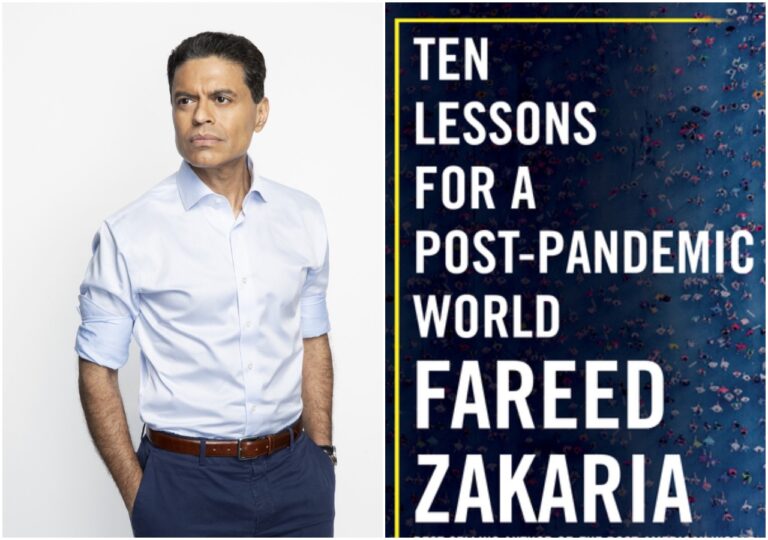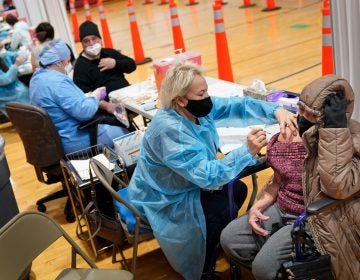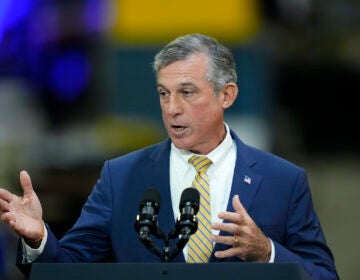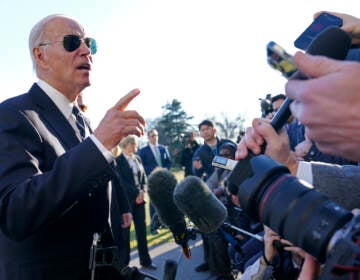Fareed Zakaria’s “Ten Lessons for a Post-Pandemic World”
The CNN host discusses how COVID-19 is rapidly changing the world and why the time is right to enact lasting reforms in politics, health care, the environment and the economy.
Listen 49:00
(photo credit, Jeremey P. Freeman)
In the United States, we are approaching 300,000 COVID-related deaths, millions of lost jobs, growing food insecurity and evictions, and these same problems are playing out in tragic ways all across the globe. In his new book, Ten Lessons for a Post-Pandemic World, CNN host and author FAREED ZAKARIA looks at the way in which COVID is speeding up economic, technological, environmental, cultural, and political trends. He says there is obviously a lot to worry about, but that there are also reasons to hope. Zakaria joins us to talk about why now is the time to make lasting reforms, such as providing health care access for all, tackling climate change, shrinking economic inequality, and reviving global cooperation.

Subscribe for more Radio Times
Interview highlights
On how the U.S. has handled the pandemic
Marty Moss-Coane: Well, I do want to talk about East Asia and the rest of the world, but I do want to focus on the United States. And as you said, the U.S. was unprepared to deal with [the pandemic]. And it’s clear that turned out to be true. How much do you think, though, is this American exceptionalism that you write about in the book? That we kind of we think we know better than anybody else and we don’t need their advice?
Fareed Zakaria: So part of what in fact, the actual trigger for that piece that I did in 2017 was that Donald Trump was trying to really substantially cut back on public health funding and public health preparedness, particularly for pandemics. So that really got my attention. So there’s one layer of it, which is just the Trump administration. There’s a second layer of it, which is we have you know, we have really, as a country refused to deal with these kinds of unusual threats. And, you know, as I say, we spend 700 billion dollars protecting ourselves against the Chinese military and the Russian military and al-Qaeda. And we spend trivial amounts of money on something like this. But at a broader level, you know, the issue that you raised is one that I worry about a lot, which is we don’t spend a lot of time looking at looking at how other countries do things. You know, if you think about health care in general, forget just pandemics, there are about 15 to 20 advanced industrial countries that offer universal health care. They all do much better than we do. We spend three times as much, for example, as Taiwan on health care, and we have worse health care outcomes on every measure, you know, life expectancy, infant mortality, look at what you will. And we really never ask ourselves, hey, we’ve got this problem. How does the rest of the world deal with it?
On the future of cities
MMC: How do you see the future of cities? And I ask that knowing that you say some really interesting things about Paris and its Mayor Hidalgo and how she is kind of reimagining or maybe even reinventing what a modern city can look like and how it can function. Describe that for us.
FZ: So historically, you would have to say that with plagues. And, you know, by the way, remember, we have lots of experience, a lot of history to look back to about plagues. Historically, cities always got emptied out, but then they always got repopulated. People would move, move out during the plague and then they’d move back in. The big difference, of course, now is you have this digital life. You have the ability to live a life digitally, to work digitally. So you have the ability to not have to come back to the city in quite the same way. What is that going to mean? My own sense is what you’re going to end up with is some hybrid model. People are still going to want to come back to cities for all kinds of reasons. But cities are going to have to adapt. And what I was struck by in the Paris example you mentioned was this is Mayor Hidalgo in Paris said, why don’t we have cities that really have the capacity to provide people with everything they want within a 15 minute walking distance.
On the free market economy
MMC: Making the segue from what you were talking about to Denmark, who you say is a country we could take some advice from.
FZ: The fascinating thing about Denmark, which I think is so interesting, is that Bernie Sanders often praises it. But then the Prime Minister of Denmark had to come out and say, unlike what Sanders is describing, we are not a socialist economy. We are a market economy. Because what Denmark has done is they’ve created a very open, very dynamic free market system. But then they use the wealth to redistribute it so that people have equality of opportunity. So you have everything from universal health care to free pre-kindergarten to nutrition programs for poor people, to free education from the cradle to PhD programs. So it’s very interesting. A nation which is very free market, but it’s very redistributionist at the same time. And that’s what I think is the future.
WHYY is your source for fact-based, in-depth journalism and information. As a nonprofit organization, we rely on financial support from readers like you. Please give today.





